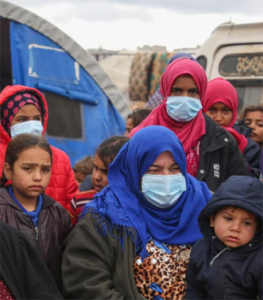Agencies fear for refugees as pandemic grows
Aid agencies have called on the global community to include refugees and displaced people in the global response to the COVID-19 crisis.
The agencies, which include Human Rights watch, the Norweigan Refugee Council and Oxfam, are particularly concerned about the potential impact the global spread of coronavirus could have on vulnerable refugees and internally displaced people (IDPs).
 They say international community must pay greater attention to how the outbreak could hit displaced populations and work collectively to find common sense solutions to contain the outbreak.
They say international community must pay greater attention to how the outbreak could hit displaced populations and work collectively to find common sense solutions to contain the outbreak.
The COVID-19 pandemic has come as more than 70 million people globally have been forced by persecution, conflict, violence and human rights violations to flee their homes. Of those, more than 29 million are refugees (including 5.5 million Palestinian refugees under UNRWA’s mandate), of whom 84 per cent are being hosted by low or middle-income nations which have weaker health, water and sanitation systems.
The agencies say the biggest challenge to an effective coronavirus response is when public health systems are weak or broken as a result of conflict and chaos.
According to UNHCR, as of 10 March 2020, over a hundred countries are reporting local transmission of COVID-19. Of those, 34 countries have refugee populations exceeding 20,000 people, which are currently unaffected by the virus. In these contexts, prevention, preparedness and communication are key.
This is because refugees and internally displaced people often find themselves in places that are overcrowded or where public health and other services are already overstretched or poorly resourced.
The agencies say it is important that governments allow the equal distribution of healthcare services for refugees and IDPs, especially in countries where many refugees live in dismal conditions and there is strong anti-refugee sentiment among national authorities.
They says another issue is that many countries affected by war and/or instability have porous borders, with refugees, economic migrants and others often travelling along informal routes. These countries can have a hard time monitoring who is entering and leaving their territory.
Refugees are especially vulnerable to coronavirus and other diseases, due to high geographical mobility, instability, living in overcrowded conditions, lack of sanitation, and lack of access to decent healthcare or vaccination programmes.
“Another issue of concern is those areas that are hardest to reach. Armed groups, checkpoints, air strikes and other impediments are frequently present and very often result in restrictions on humanitarian movements and operations. Operations in these areas face great difficulties and are sometimes impossible,” said a statement from the Norweigan Refugee Council.
“Refugee populations are often left out of disaster and epidemic preparedness planning, even at the best of times. Reaching marginalised refugees and migrants with information can also be a challenge. Operations must work with national authorities, health ministries, WHO and partners to ensure full inclusion of refugees and others of concern in national preparedness and response plans. They must also ensure that such populations have access to accurate and relevant information in applicable language(s) in line with the national level of preparedness,” the report said.
The agencies say there should be no forced returns of refugees or displaced persons based on real or perceived fears of coronavirus transmission. Any restrictions on freedom of movement, or other measures instituted by governments, should be applied to displaced people in a non-discriminatory way.
“Refugees and migrants are often the first to be stigmatised and are often unjustifiably blamed for spreading viruses. We have seen some populist politicians across Europe who rail against migration and are attempting to draw a clear link between migrants and refugees and the outbreak, despite there being no evidence to support this,” the NRC said.












